Over the past few weeks, the Tłı̨chǫ region in the Northwest Territories has been alive with learning. From hands-on seed collection to in-depth environmental monitoring, community members are gaining the tools and training needed to support long-term restoration, reforestation, and climate resilience on their lands. These training sessions are key pieces of a larger, community-led effort to plant one million trees on Tłı̨chǫ lands—an ambitious and vital project to restore boreal caribou habitat devastated by wildfires.
Training in Behchokɔ̀
On May 21 and 22, 2025, a group of 12 participants gathered in Behchokɔ̀ for field-based training through the Indigenous Seed Collection Program (ISCP), delivered by the National Tree Seed Centre of Natural Resources Canada. This two-day session focused on the fundamentals of native seed collection: forecasting readiness, proper harvesting techniques, equipment use, field data collection, and post-harvest handling.
Participants gained hands-on experience collecting seeds in the field based on seasonal availability. Beyond technical knowledge, the session aimed at building local Tłı̨chǫ capacity in plant identification and seed management—critical skills to support ongoing reforestation and conservation efforts.
The workshop marked the first phase of a two-part learning journey. Later this year, participants will deepen their understanding through lab-based training at the National Tree Seed Centre in Fredericton, New Brunswick.
Participants gathered in Behchokɔ̀ for field-based training through the Indigenous Seed Collection Program (ISCP).
Environmental and Revegetation Courses
To build on this momentum, two additional training programs were recently delivered in the community. Both were open to all community members:
1. Environmental Monitor Training Program (EMTP)
From May 31 to June 14, participants from each of the four Tłı̨chǫ communities took part in a 90+ hour course through ECO Canada’s BEAHR program. This nationally recognized initiative equips learners with foundational environmental knowledge, data collection techniques, and essential health and safety protocols. It also emphasizes local and traditional knowledge, preparing graduates for direct roles in reforestation and monitoring.
2. Revegetation of Disturbed Lands Course (NAIT + Aurora College)
Held from June 9 to 13 at the Behchokɔ̀ Community Learning Centre, this 30-hour micro-credential course taught participants how to identify native boreal species, apply planting techniques, and monitor restoration efforts. Delivered in partnership with the Northern Alberta Institute of Technology and Aurora College, the course used immersive tools like 360° video and fieldwork to foster practical, place-based skills.

Tłı̨chǫ Elders hold seedlings during a ceremony.
Tłı̨chǫ Leadership in Restoration
These training sessions are part of the broader effort to build local capacity and environmental leadership in the Tłı̨chǫ region. Tree Canada is proud to support and highlight community-led efforts that align with the One Million Trees initiative—a collaborative reforestation project between the Tłı̨chǫ Government, Let’s Plant Trees and Tree Canada. The project aims to help restore habitat for the threatened boreal caribou while reviving ecosystems damaged by recent wildfires.
Guided by the Tłı̨chǫ principle of “Strong Like Two People,” this work integrates traditional knowledge and Western science. Community members are involved at every stage, from seed collection and planting to monitoring and stewardship. As Grand Chief Jackson Lafferty has said, “Tłı̨chǫ people have resided on the land since time immemorial,” and this effort supports their long-term commitment to sustaining land, water, and wildlife.
Together, these trainings are more than isolated learning opportunities—they are part of a growing movement toward community-driven environmental restoration, leadership, and resilience in the North.
Back to all articles



